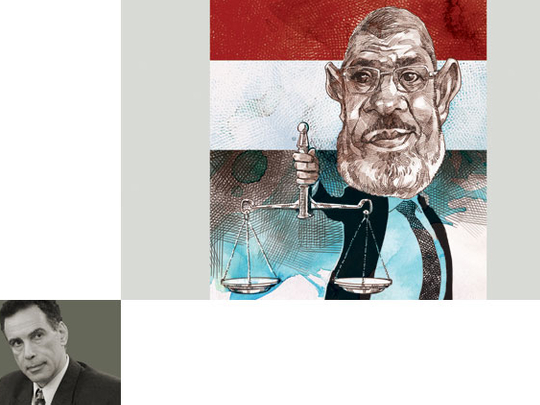
I write from Cairo and I feel pity for Mohammad Mursi. The Egyptian president hardly had the time to bask in the glory that history bestowed upon him: The first democratically elected Egyptian president; a politically conservative man entrusted with a revolutionary agenda to promote fundamental freedoms and social justice. Mursi seemed up to the challenge.
Moreover, in his first regional test, he astounded cynical observers and accomplished the remarkable feat of negotiating a truce that ended a bloody war between deadly enemies: Hamas and Israel. He was showered with praise from regional and international leaders, including the American President Barack Obama. Mursi even made it to the cover of Time magazine.
And suddenly and incomprehensibly the Egyptian president began acting like a character in a Woody Allen film. In his parody of Latin American revolutions — Bananas — Allen says to the San Marcos revolutionary leader, who had just overthrown a dictator and proclaimed himself president: “At last this country can finally bask in the sunshine of a true democracy, where there’s equal opportunity; and respect for law and order.” To which the revolutionary-cum president replies: “Right now, I am the law.”
This is essentially the message President Mursi sent to his countrymen and to the international community when he granted himself immunity from the law with his so-called constitutional declaration.
The reaction of the Egyptian street was furious; demonstrators took to the streets, reoccupied Tahrir Square, the seat of the January 25 Egyptian revolution. Others camped in front of the presidential palace. In clashes between pro and anti-Mursi demonstrators and with the security forces, some seven people died and dozens were injured. Leaders of the various opposition parties formed a National Salvation Front and demanded that Mursi revoke his constitutional declaration and postpone the vote on the draft constitution scheduled for mid-December. Several street demonstrators accused the newly elected president of being a dictator and called for his removal.
Now, the Egyptian president is an honourable man and he ought to be given the benefit of the doubt. There is no reason to believe that he harboured dictatorial designs nor that he was plotting to establish yet another authoritarian regime.
He should be taken at his word, namely that he did not intend to use the extraordinary power he had given himself and that in any case the constitutional declaration that caused the crisis was destined to be annulled with the vote on the draft constitution. If this be indeed the case, then the least that could be said is that the Egyptian president was ill-advised and that in vastly underestimating the impact of his action — he lacked foresight.
If Mursi’s first instinct was undemocratic; his reaction to the crisis his action unleashed was not. He called for a national dialogue and indicated his willingness to compromise.
The leaders of the opposition, however, failed to rise to the challenge of placing the national interest above partisan interest.
Instead of accepting the president’s public invitation for a dialogue without preconditions they boycotted the dialogue and insisted on the satisfaction of their demands before any dialogue could take place.
This is a shortsighted position. Insisting on the satisfaction of their demands before any dialogue leaves nothing to negotiate about. It also creates the humiliating spectacle of a triumphant opposition coming to the presidential palace to receive the instruments of surrender from the defeated president. The person of the president will be humiliated as the office of the president will be diminished.
Just as the message “I am the Law” is profoundly undemocratic and not befitting a democratically elected president, the message of the opposition — “Our Way or the Highway” — runs counter to the democratic principle of compromise through dialogue and fuels the anger of the Egyptian street.
Perhaps Mursi’s biggest mistake, however, is his failure to build consensus and reach out. The essence of democratic governance is reconciling competing interests through dialogue and consensus building. He must have been aware that various social and political forces never accepted his electoral victory and would wish for nothing more than to see him fail.
It takes courage and hard work to confront these forces and bring them into the fold of the democratic fabric of the society. In other words, the Egyptian president should have invested time and energy in becoming and being seen to become the president of all Egyptians. The polarisation of the angry demonstrators into pro and anti-Mursi was clear evidence of the degree of alienation of the citizen from his government.
I also think it is a mistake to rush the draft constitution without adequate national debate and a concerted effort to include the input of all stake holders in the Egyptian society especially women and the youth.
The Egyptian president and his entourage say that the president has no option but to comply with the mid-December date, required by law. If the law could be bent to accommodate a constitutional declaration by the president, surely, arrangements can be made to accommodate the interest of the people.
And it is in the interest of the people to have all the time they need, but not indefinitely, to understand, analyse and debate the 236 clauses of the draft constitution and reach some broad consensus, before putting it to a popular vote.
Some articles are vague and need clarification; some other articles are controversial and need a national debate. Article 6, for example, defines Egypt’s political system as “democracy and Shura.” Does this mean half democracy, half Shura? Or mostly democracy and some Shura? Or mostly Shura and some democracy? And in case of conflict, which one prevails? At stake is nothing less than the future identity of Egypt.
Adel Safty is distinguished professor adjunct at the Siberian Academy of Public Administration, Russia. His new book, Might Over Right, is endorsed by Noam Chomsky and published in England by Garnet, 2009.










